
A well-maintained car not only provides reliable transportation but also saves you money on repairs and replacements. Extending your car’s lifespan is achievable with consistent care, attention to detail, and smart driving habits. This guide offers practical tips to ensure your car remains in excellent condition for years to come.
Why Is Proper Maintenance Important for Your Car’s Lifespan?
- Reduces Wear and Tear: Routine maintenance prevents small issues from escalating into major problems.
- Increases Resale Value: A well-maintained vehicle fetches a higher price when sold.
- Ensures Safety: Keeps critical systems like brakes and tires in optimal condition.
- Saves Money: Avoids costly repairs and enhances fuel efficiency.
Essential Maintenance Tips to Prolong Your Car’s Life
1. Follow the Manufacturer’s Maintenance Schedule
- Adhere to service intervals outlined in your car’s manual.
- Prioritize tasks like oil changes, filter replacements, and tire rotations.
2. Check and Replace Fluids Regularly
- Maintain appropriate levels of oil, coolant, transmission, and brake fluids.
- Flush and refill fluids as per manufacturer recommendations.
3. Keep Tires in Good Condition
- Inspect tire pressure monthly and inflate to the recommended PSI.
- Rotate tires every 5,000–7,500 miles to ensure even wear.
- Replace tires with worn treads to maintain safety and performance.
4. Test and Maintain the Battery
- Clean corrosion from battery terminals.
- Test battery health annually and replace it every 3–5 years or as needed.
5. Replace Filters
- Change air filters every 12,000–15,000 miles or as advised in the manual.
- Replace fuel filters to prevent contaminants from damaging the engine.
Preventive Measures to Avoid Major Issues
Inspect Belts and Hoses
- Check for cracks, fraying, or leaks during regular inspections.
- Replace worn-out belts and hoses promptly.
Monitor Warning Lights
- Address dashboard alerts like the check engine light immediately.
- Use an OBD-II scanner or visit a mechanic to diagnose issues.
Maintain Brakes
- Listen for squealing or grinding noises.
- Replace brake pads and fluids to ensure responsive braking.
Smart Driving Habits to Extend Your Car’s Lifespan
Avoid Aggressive Driving
- Accelerate gradually and brake smoothly to reduce strain on the engine and brakes.
Warm Up the Engine
- Allow the engine to reach operating temperature before driving in cold weather.
Lighten the Load
- Remove unnecessary weight from the trunk to improve fuel efficiency and reduce strain on suspension.
Plan Routes Wisely
- Combine errands to minimize cold starts and reduce wear and tear.
Long-Term Strategies for Longevity
Invest in Quality Parts
- Use OEM (Original Equipment Manufacturer) parts for replacements to ensure compatibility and durability.
Protect Your Car’s Exterior
- Wash and wax regularly to prevent rust and paint damage.
- Park in shaded or covered areas to avoid UV damage.
Store Your Car Properly
- Use a car cover or garage to protect your vehicle during long-term storage.
- Disconnect the battery if the car won’t be used for extended periods.